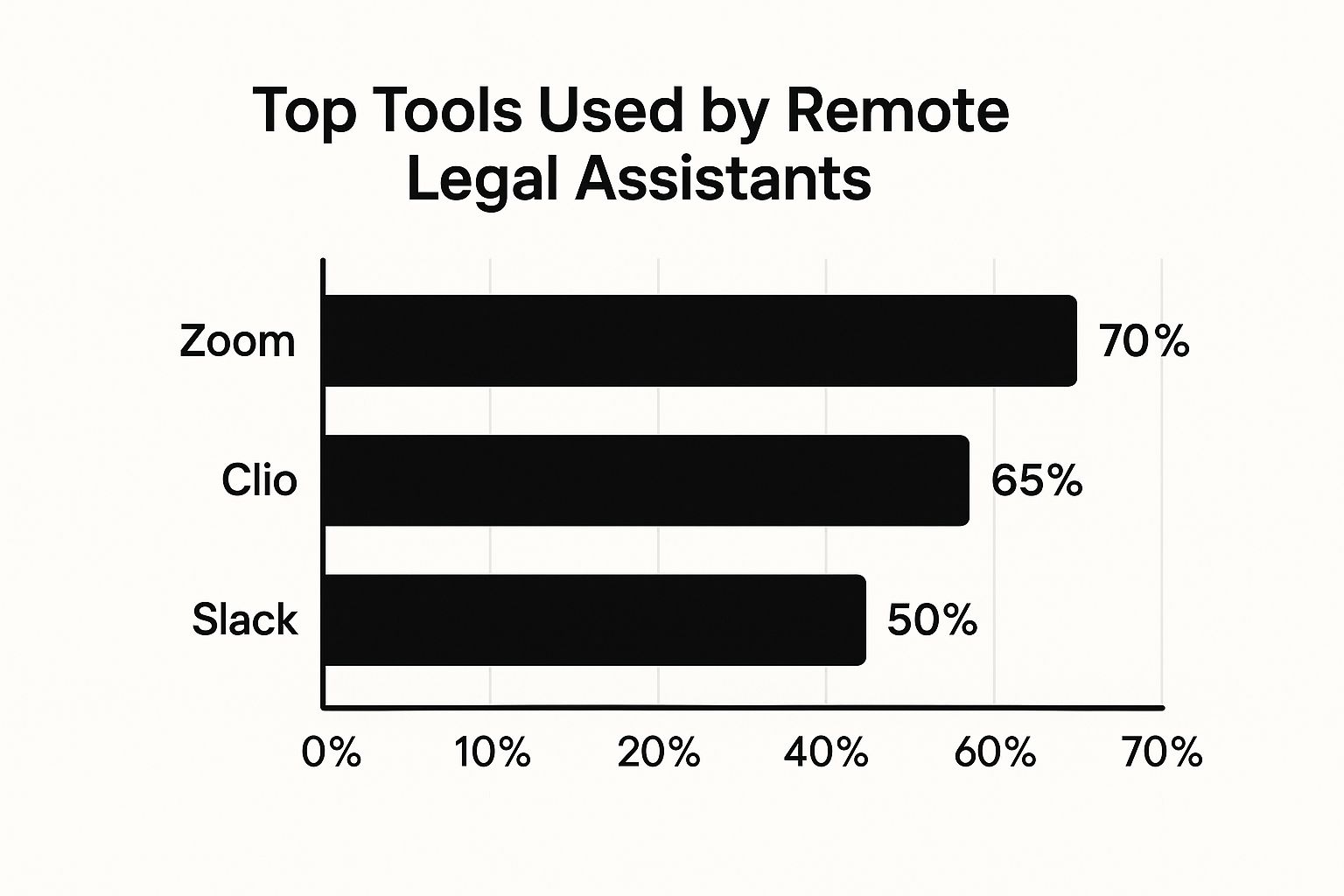
 16 minutes read
16 minutes read
Thinking about ditching the soul-crushing commute for good? Let's be real—the dream of handling depositions from your home office is a whole lot better than rush hour traffic. The good news is that legal assistant remote jobs aren't some mythical creature anymore. The bad news? Everyone else wants one, too.
The idea sounds great, doesn't it? Trading fluorescent office lights for natural sunlight. Replacing stale breakroom coffee with a brew from your own kitchen. But breaking into the remote legal world isn't as simple as flipping your LinkedIn status to "Open to Work." Hope you enjoy fact-checking resumes and running interviews—because you're about to become your own headhunter.

Forget the generic advice you’ve already read a dozen times. This is about what's really happening out there, from someone who's seen it all—the good, the bad, and the job descriptions that are definitely too good to be true. Think of this as the reality check you need before diving headfirst into the application abyss.
The pandemic didn't invent remote work; it just slammed the fast-forward button. Firms that once insisted on face-to-face time suddenly had to trust their teams from afar. Some embraced it. Others are still trying to shove that genie back in the bottle.
This isn't just a fleeting trend; it's a fundamental rewiring of the legal industry. A recent report revealed that a whopping 67% of law firms have increased their hiring of remote legal support staff. That’s not a fluke—it’s a direct result of firms finally realizing they can access top-tier talent without mortgaging the office ping-pong table.

The bottom line? The demand is there. Firms get to access a national talent pool without paying for another desk and a parking spot. It's a win-win, but only if you can prove you’re the right bet.
This new landscape opens up a ton of opportunities, but it also means the competition is fiercer than ever. You're no longer just competing with local candidates; you're up against every qualified legal assistant with a Wi-Fi connection.
Here's the brutal truth you need to accept before you even think about applying:
Ready to get tactical? This is about making a smart career move, not just a change of scenery.
Let's get one thing straight. The skills that made you a rockstar in a traditional office are just the price of admission for a remote role. Being great at drafting documents and managing a calendar is the baseline. The bare minimum.
What hiring managers for legal assistant remote jobs really want to see is proof that you can thrive without someone watching your every move.
You're not just a legal assistant anymore; you're also your own IT support, office manager, and chief motivation officer. It's a whole new ballgame, and your resume needs to scream, "I was built for this."

This is about more than just knowing how to use Zoom. It’s about proving you have unshakable self-discipline and the tech fluency to match.
Forget about the luxury of grabbing the IT guy from down the hall. When you're remote, you are the IT department. A resume that's vague on core legal tech is a non-starter. End of story.
You need to show you’re fluent in the tools that modern law practices actually run on. This isn’t a wish list; it’s a list of essentials.

Don’t just list software on your resume. That’s lazy. Weave it into a story of your accomplishments. For instance: "Managed a caseload of 50+ litigation files using Clio, which streamlined document access and cut retrieval time by 30%." See the difference? One is a fact; the other is a result.
Beyond the software, it's the intangible skills that truly set top remote candidates apart. These are the traits that prove you won't disappear the second you're out of sight.
First up is proactive, crystal-clear communication. In a remote setting, you have to over-communicate. This means sending daily wrap-up emails, flagging potential issues before they become dumpster fires, and writing messages so clear they leave zero room for misinterpretation.
Next, you need bulletproof time management. Can you structure your day, hit every deadline, and stay focused when your couch and Netflix are calling your name? Firms are betting their billable hours on your ability to do just that. Highlighting certifications on your resume is a great way to signal this kind of dedication. You can find more details on paralegal certification requirements to see what might fit.
Finally, you must be a resourceful problem-solver. When a document won’t upload or a client can't access a shared folder, you’re the first line of defense. It’s about taking ownership and finding a solution, not waiting for someone to tell you what to do. These are the skills that make a remote legal assistant truly indispensable.
Let’s be honest. Your resume has about six seconds to impress a hiring manager who's juggling a hundred other applications, three urgent deadlines, and a lukewarm coffee. Sending a generic, one-size-fits-all resume for a remote job is a one-way ticket to the digital trash can.
If you enjoy staring at a silent inbox, by all means, keep doing what you're doing. But if you want to get tactical and actually land an interview, it's time for a new approach.
This isn’t just about listing your old duties. It’s about reverse-engineering the job description to convince a machine—and then a human—that you’re the only person for the job.

You’ll see software like Clio pop up in job descriptions all the time. Getting comfortable with these tools is non-negotiable, and your application needs to make it painfully obvious that you already know your way around them.
First thing's first: you need to learn to speak bot. The Applicant Tracking System (ATS) is the gatekeeper, and every remote job posting is loaded with the keywords it’s programmed to find. Your mission is to feed the bot exactly what it wants.
Go old school. Print out the job description and grab a highlighter. Isolate every specific skill, piece of software, and responsibility they mention.
Don't just keyword-stuff. Saying you "used Clio" is weak. It tells me nothing. Instead, show me. Saying you "managed a 75+ case docket using Clio for client intake, billing, and document management" proves you’ve actually been in the trenches.
Here’s a trick most legal assistants completely overlook: create a mini-portfolio. I know, it sounds weird for this role, but it’s a game-changer that will immediately separate you from the endless pile of text-only resumes.

A portfolio isn't about sharing confidential information. It’s about showcasing your skills in a tangible way. It’s the difference between telling them you’re organized and showing them.
Put together a simple PDF with 2-3 examples of your work. The golden rule here is to redact everything to protect client confidentiality—names, dates, case numbers, and any other identifying details must be blacked out. Seriously, black them out.
So, what should you include?
Attaching this to your application is a power move. It tells the hiring manager you’re a serious professional who goes the extra mile—precisely the kind of person they can trust to work effectively from a thousand miles away.
Spoiler alert: blindly blasting your resume on massive job boards is like fishing in a puddle and hoping to catch a marlin. Sure, you might get a bite, but it’s probably not what you want. Spending hours scrolling through thousands of generic listings for legal assistant remote jobs is a recipe for burnout.
Hope you enjoy getting ghosted by faceless corporate portals—because that’s the reality for most applicants who don't have a strategy. It's time to hunt smarter, not harder.
This isn’t just a list of websites; it’s a battle plan. We’re going to expose the time-wasters and focus on the platforms that actually lead to interviews with real, breathing law firms.
The big job aggregators are black holes. Your carefully crafted application gets sucked into an algorithm alongside ten thousand others. The real gems are found on specialized platforms where law firms go when they need qualified legal support, not just another warm body.
Here’s where you should be focusing your energy:
Don’t just "use" LinkedIn. Wield it like a weapon. Hitting "Easy Apply" is the laziest move possible and recruiters know it. The real power is in targeted networking.

Your goal on LinkedIn isn't to ask for a job. It’s to build connections with hiring managers, recruiters, and attorneys at firms that hire remotely. A warm introduction is 10 times more effective than a cold application.
This means engaging with their content, sharing insightful comments, and sending personalized connection requests. It’s a long game, but it pays off by putting you on their radar before a job is even posted. That’s how you skip the line.
The chart below shows some of the key tools you'll be expected to master. No surprises here.

This data clearly shows that proficiency in communication and case management software is non-negotiable for remote legal work.
So, you landed the interview. Pop the champagne. But now comes the real test: convincing a hiring manager over a video call that you’re the organized, self-motivated pro they need. This isn't the time for your cat to make a cameo or for your smoke alarm to start chirping.
The virtual interview is a different beast. A firm handshake doesn't matter, but your Wi-Fi signal absolutely does. You're not just answering questions; you're actively demonstrating your remote work readiness.
First things first, your backdrop. A pile of laundry in the corner doesn't exactly scream "detail-oriented." You don't need a professional studio, but a clean, quiet, and well-lit space is non-negotiable. A simple, neutral wall is infinitely better than a cluttered room.
Beyond the visuals, your technical setup has to be flawless.
Think of it less as an interview and more as a performance. You're auditioning for the role of a reliable, independent professional.
You made it through the interview—fantastic. Now comes the awkward dance of compensation. Negotiating your salary for a remote position requires a different approach. You can't just benchmark against local averages when the firm could be based three states away.
You need to walk into this conversation armed with data. As of August 2025, the average annual salary for a remote legal assistant in the U.S. hovers around $48,215. That said, the range is huge, with top earners bringing in over $66,500 per year. Dig into the latest figures on sites like remote legal assistant salaries on ZipRecruiter.com.

Here’s how you frame it: Your value isn't just in your skills, but also in the direct savings you represent. They aren't paying for your office space, equipment, or utilities. That reduction in their overhead is a powerful piece of leverage in your negotiation.
Don't be afraid to start with a figure at the higher end of your research, especially if you have specialized experience. Justify it by highlighting your proficiency with specific software or your proven ability to handle a complex caseload entirely remotely.
Your goal is to be compensated for your expertise and the unique value you bring as a remote professional, not just for filling a virtual seat.
Alright, let's get into the weeds. You’ve probably got a few nagging questions buzzing around your head. Good. A healthy dose of skepticism is smart when you’re talking about a major career shift.
So, let's tackle some of the most common questions I hear—with straight, no-BS answers.
It’s easy to get swept up in all the "return to office" chatter and start to worry that you’ve missed the boat.
Here’s the reality: the initial gold rush might be over, but the market is stabilizing, not vanishing. The legal world moves at a glacial pace, but even it can’t ignore the massive advantages of hiring top-tier remote talent.
That said, you need to be realistic. According to some mid-2025 data, only about 7% of legal job postings were for fully remote positions. Compare that to 31% for hybrid roles and a whopping 62% for fully onsite. Competition for those remote-only spots is fierce. You can dig deeper into the legal job market trends on RobertHalf.com.

The takeaway? The jobs are there, but they go to the most prepared, professional, and persistent candidates. This isn't a casual scroll-and-apply game; it's a strategic hunt.
This is the big one, isn't it? Short answer: yes, you absolutely can. But it’s not a given.
Some firms will try to lowball you, arguing that your cost of living is lower or that you’re saving money on gas. Don’t fall for it.
Your salary should be based on your skills, your experience, and the value you deliver—not your zip code. Here’s how you handle it:
Your compensation is about the problems you solve for the firm. Period. Where you solve them from is irrelevant.
Out of sight, out of mind? It’s a legitimate fear. In an office, you can build rapport just by being present. Remotely, you have to be much more intentional.
But visibility isn't about being the loudest person on Slack. It’s about consistently being the most reliable person on the team.
Proactively update your supervising attorney on your progress. Volunteer for the challenging assignments others might shy away from. Make your contributions so valuable they're impossible to ignore. When you work from home, your work product is your reputation. Make it impeccable.
Tired of sifting through thousands of generic job postings? At HireParalegals, we connect US law firms with top-tier, pre-vetted remote legal talent. We do the hunting so you can focus on what you do best. (Toot, toot!) Find your next remote legal role with us.